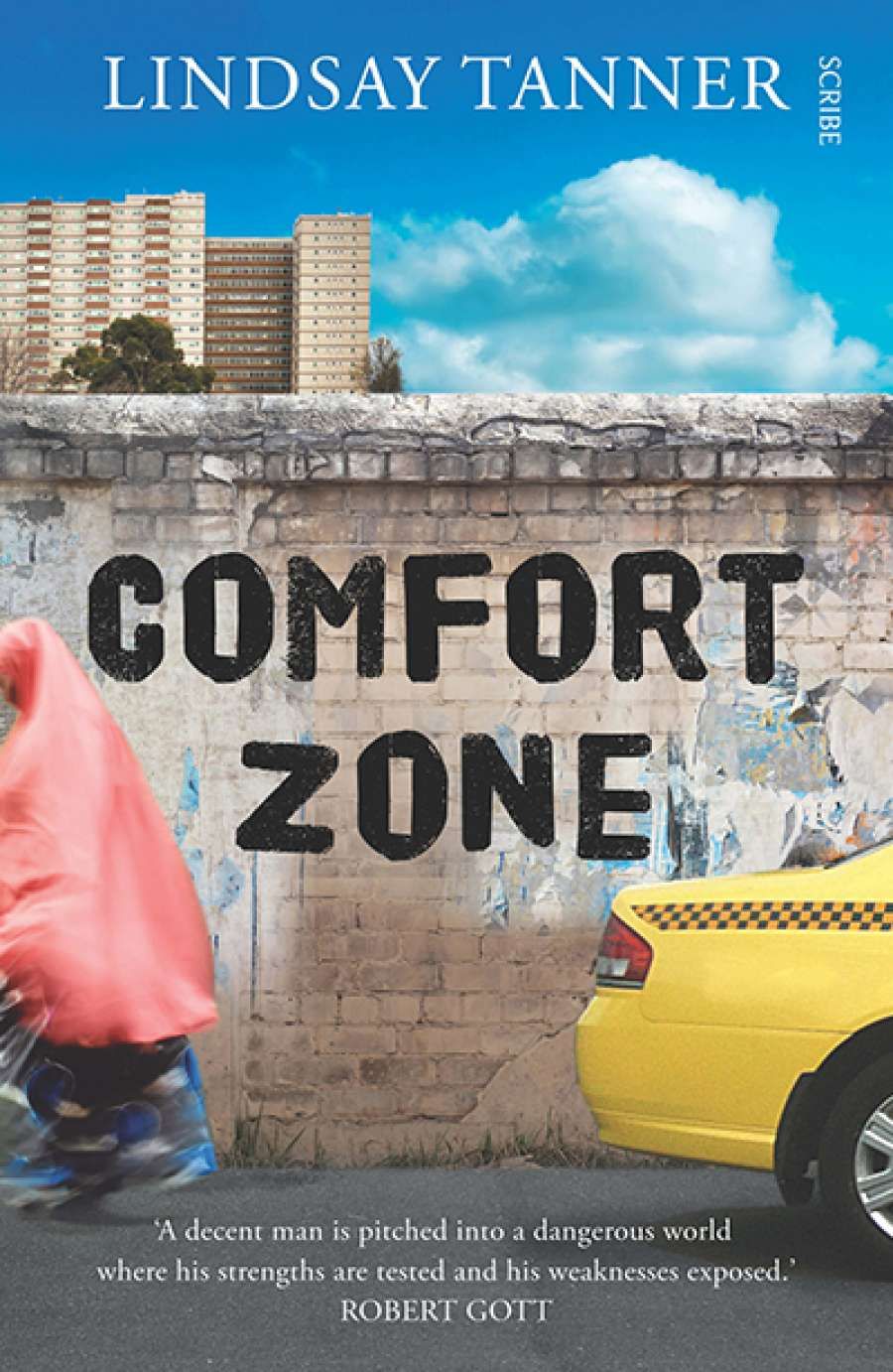
- Free Article: No
- Contents Category: Fiction
- Custom Article Title: Joel Deane reviews 'Comfort Zone' by Lindsay Tanner
- Custom Highlight Text:
I interviewed Lindsay Tanner once, back in 2012. Tanner was sixteen months retired from political life, and I had come seeking insight into the workings of the Victorian ...
- Book 1 Title: Comfort Zone
- Book 1 Biblio: Scribe $29.99 pb, 240 pp, 9781925321029
Reading it, I was reminded of something Craig Sherborne said at the launch of his memoir Muck (2007). Sherborne said that every book – no matter what subject it purports to be about – was really about its author. It was a classic Sherborne proclamation, shorn of equivocation, as definitive as a commandment chiselled into a stone tablet. At the time, I liked the sound of what Sherborne was saying, but not the sense. What about biographies or histories? Or economic treatises? Or novels?
Increasingly, though, I'm coming around to Sherborne's way of thinking. No matter what genre authors choose, their subject matter and the manner in which they tell it, the story they tell cannot help but be guided by the circumstances that have shaped them. Even when authors hide, they are still present, consciously or unconsciously submerged like Captain Ahab's whale beneath the surface of the text.
Tanner's absence from Comfort Zone is both conscious and unconscious. Speaking to the Sydney Morning Herald before the publication of his novel, Tanner said he had decided to avoid writing about politics because it was 'boring'. 'It's risky too,' he said. 'Even without thinking, you would end up inserting characters that are based on real people.' Instead, Tanner chose to tell the story of the inner suburban battlers ‒ from crims to losers to refugees – that he represented as a politician. In the opening pages, the reader is introduced to Jack Van Duyn, a grumpy, casually racist taxi driver the wrong side of fifty. Jack is, as the author points out numerous times, a loser. He lives by himself in a crap flat in Brunswick and alternates between the cab and the pub.
 Lindsay Tanner (courtesy of Mosman Library, via Wikimedia Commons)Through a series of coincidences – too many for my taste – Jack becomes infatuated with a beautiful Somali mum called Farhia Mohammed and entangled with a glib financier called Matthew Richards, who (like the author) works at 101 Collins. Before long, Jack, Farhia, and Matt put each through an obstacle course of trials and tribulations that involve Somali pirates, ASIO, drug dealers, an old-fashioned knuckle-man called Scabber, and a beautiful woman with chronic fatigue syndrome called Emily.
Lindsay Tanner (courtesy of Mosman Library, via Wikimedia Commons)Through a series of coincidences – too many for my taste – Jack becomes infatuated with a beautiful Somali mum called Farhia Mohammed and entangled with a glib financier called Matthew Richards, who (like the author) works at 101 Collins. Before long, Jack, Farhia, and Matt put each through an obstacle course of trials and tribulations that involve Somali pirates, ASIO, drug dealers, an old-fashioned knuckle-man called Scabber, and a beautiful woman with chronic fatigue syndrome called Emily.
Along the way, Tanner takes the reader to a variety of venues, including the Dan O'Connell Hotel, various Housing Commission flats, a drug dealer's compound in Doncaster, and Dracula's Cabaret Restaurant in the city.
What's impressive is the genuine warmth the author shows for his protagonists. Tanner creates his characters with care, tests them with circumstance, and has the stamina to follow them to a resolution. Tanner – who has a solid track record as a non-fiction author – also displays flashes of descriptive ability at the keyboard. However, the annoyances that accrued during the reading of Comfort Zone make it impossible for me to recommend this to the casual reader. Tanner exudes warmth, but that is not enough. His fiction lacks the humour of a Shane Maloney, the hard-bitten local knowledge of a Garry Disher, or the laconic verve of a Peter Temple. His attention to detail is especially problematic. For instance, when Tanner was describing Doncaster it sounded more like East Doncaster – I live in Doncaster and, believe me, there's a difference. Also, the Dan O'Connell Hotel is one of Melbourne's better known venues for live poetry readings, but that motley crowd were strangely absent from the novel's scenes in the Dan.
. The Dan O'Connell Hotel in Melbourne (photograph by Adam Dimech, via Flickr)
The Dan O'Connell Hotel in Melbourne (photograph by Adam Dimech, via Flickr)
To make matters worse, Tanner keeps getting in the way of the story. Although he has consciously excluded a representation of himself or his tribe from the story, the politician in Tanner just can't help himself. He constantly intrudes to bang on about the cultural relevance of the Sunbury music festival or the gentrification of the inner suburbs or whether or not Somali blokes chew too much Qat leaf. Few of those intrusions enhance the story. All they do is remind the reader that this book is about Lindsay Tanner in absentia.
What's most disappointing about Comfort Zone is that I suspect Tanner could do much better if he was prepared to take the risk of writing about the political and corporate worlds he inhabits and adhered to the writing maxims of crime writer Elmore Leonard – particularly the one about leaving out the parts that readers tend to skip. Until he takes a risk, Tanner's fiction will, much like Jack Van Duyn, remain in a comfort zone.


Comments powered by CComment